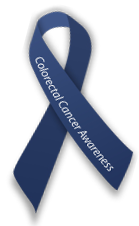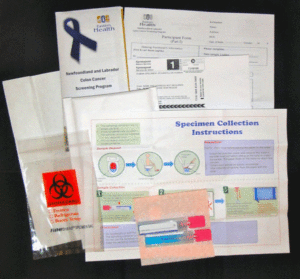Colon Cancer Screening Program

The goal of the Newfoundland and Labrador Colon Screening Program is to reduce the impact of colon cancer on the people of the province. The colon screening program seeks to find colon cancer early when treatment is most effective or find colon polyps before they may grow into cancer.
About colon cancer
Colon cancer is also known as colorectal or bowel cancer. It is cancer of the wall of the colon or rectum. The colon is also called the large intestine or large bowel; it is approximately five to six feet long. The rectum is the last few inches of the colon.
Colon cancer generally develops from tiny growths called polyps inside the colon or rectum. Polyps start out as small harmless growths on the inner wall of the colon. However as polyps grow larger, some may turn into cancer.
Risk factors

A risk factor is any condition that makes a person more likely to develop a certain disease like cancer. Some risk factors such as diet can be changed while others, like age, cannot. Risk factors for colon cancer include:
- Age (mainly after the age of 50)
- Family history of colorectal cancer or polyps
- Diet high in red meat and low in fiber
- Lack of exercise
- Obesity
- Smoking and/or excessive alcohol use
- Personal history of crohn’s disease or ulcerative colitis
Signs and Symptoms
Colon cancer may not show any signs or symptoms (warning signs) in its early stages.
Symptoms may include:
- Blood in or on the stool
- Diarrhea and/or constipation or other change in bowel habits
- Narrow stool
- Abdominal pain, cramps, tenderness or bloating
- Tiredness
- A feeling that your bowel does not empty completely
Having one or more of these symptoms does not mean you have colon cancer, but you should consult with your health-care provider.
Who should have colon screening?
The Colon Cancer Screening Program recommends that all people aged 50 to 74 who are considered at average (normal) risk for colon cancer be screened with a home screening test called the Fecal Immunochemical Test (FIT). This includes people who:
- have no personal or family history of colon cancer;
- have not had a colonoscopy (the light put up) in the last five years; or are currently scheduled for one; and
- have no personal history of inflammatory colitis or Crohn’s disease.
People with a family history of colon cancer might have a higher chance of getting colon cancer. If you have:
- a parent, child or sibling diagnosed with colon cancer under the age of 60 a colonoscopy is recommended.
- two such family members with colon cancer, colonoscopy is recommended.
- one family member diagnosed over the age of 60 with colon cancer, you can be screened with a FIT kit.
- more distant relatives diagnosed with colon cancer such as aunts, uncles, cousins, grandparents, you may be screened with a FIT kit.
Families in our province can be quite large and have complicated medical issues. Family history and genetics play an important role in the development of many cancers including colon cancer. If you have any questions about your family history and it’s impact on your risk of cancer this should be discussed with your primary care provider (Family Physician or Nurse Practitioner).
Benefits of colon cancer screening
Screening is checking for health problems before signs and symptoms appear.
Colon cancer screening is important in preventing cancer though early detection of colon cancer and treatment of polyps. Early detection allows for appropriate and timely treatment.
The home screening test (FIT) is an advanced and sensitive test, but no test is 100 per cent accurate. There is a chance that a problem can be missed if a polyp or cancer was not bleeding when you did the test so regular screening every two years is important.
The Screening Test

The colon screening program uses a test known as the Fecal Immunochemical Test (FIT). This test is completed at home and sent to a lab for testing.
FIT will check for blood in the stool that cannot be seen with the naked eye. It is more advanced and sensitive than other available stool tests and is considered an effective method for screening those at average (normal) risk for colon cancer.
The FIT test will be used once every two years by people who take part in the colon screening program. If you do not have a family doctor you can still take part in the colon screening program.
Contact Us (How to get a FIT kit)
It is simple and easy to get a home screening kit for colon cancer. There are three main ways to take part:
- Contact the Colon Cancer Screening Program at 1-855-614-0144 or 709-752-6713;
- Email us at nlccsp@easternhealth.ca; or
- Have your family doctor or other health-care provider complete a short referral form (PDF) and fax it to 709-752-6711.
Frequently Asked Questions and Resources
- What happens after the test?
- What does a normal (negative) test mean?
- What does an abnormal (positive) test mean?
- What is a colonoscopy?
- What happens if something is found on my colonoscopy?
- What happens if my colonoscopy result is normal (negative)?
- Why are people only between the ages of 50 and 74 being screened?
- How reliable is the FIT?
- If I have hemorrhoids should I take the test?
1. What happens after the test?
Your samples are mailed directly to a laboratory within Eastern Health to be analyzed and the results are sent to the colon screening program. The screening program will then forward the results to you and your health-care provider.
2. What does a normal (negative) test mean?
A normal (negative) test means that blood was not found in your stool. However, as a member of the colon screening program, you will receive another letter and test kit in two years.
3. What does an abnormal (positive) test mean?
An abnormal (positive) test means that blood may have been found in your stool. Do not panic, there are many reasons for blood being found in your stool.
A positive FIT result does not necessarily mean that you have colon cancer; however, more testing is normally required to see where the blood is coming from.
The colon screening program will contact you about follow-up care. The usual follow-up test that is arranged is a colonoscopy.
4. What is a colonoscopy?
Colonoscopy involves passing a thin flexible tube into the rectum and gently guiding it along the colon. This tube has a tiny camera on the end, and allows the doctor to examine the bowel for polyps. If there are polyps, the doctor will remove them during the test.
The day before the colonoscopy, you will need to completely clean out your colon using a laxative that will be prescribed for you. This is an important step, as it allows the doctor to have a good view of your colon. Before the test you will be given medications to relax you.
Because you have been given medications you will need someone to drive you home. For most people, a colonoscopy is a straightforward procedure; however, on rare occasions, some people may have bleeding or other complications such as a perforation (tear) that may require a hospital stay.
To learn more about what happens during and after a colonoscopy, watch this video.
5. What happens if something is found on my colonoscopy?
If the doctor finds one or more polyps or cancer during your colonoscopy he/she will discuss with you the test results and possible further follow-up. You will no longer be a participant of the screening program, but will be followed by your family doctor or specialist with the appropriate medical treatment to address the situation.
6. What happens if my colonoscopy result is normal (negative)?
You will remain in the colon screening program and will be sent another FIT in five years.
7. Why are people only between the ages of 50 and 74 being screened?
More than 90% of the people diagnosed with colon cancer are over the age of 50. Experts and research has recommended that screening begin at the age of 50 for those who are considered average (normal) risk for colon cancer. If you have concerns or questions about screening that is right for you, please contact your family doctor or other health-care provider.
If colon cancer is slow-growing, why do you need to be screened every two years?
Over the span of two years, you may develop signs or symptoms that were not present during your last test. As well, blood may be found that was not found on your previous home screening test (FIT).
8. How reliable is the FIT?
The FIT is an advanced and sensitive test, but no test is 100% accurate. There is a chance that a problem can be missed if a polyp or cancer was not bleeding when you completed the home test. That is why regular screening every two years is so important.
9. If I have hemorrhoids should I take the test?
You can complete the test as long as your hemorrhoids are not bleeding.
